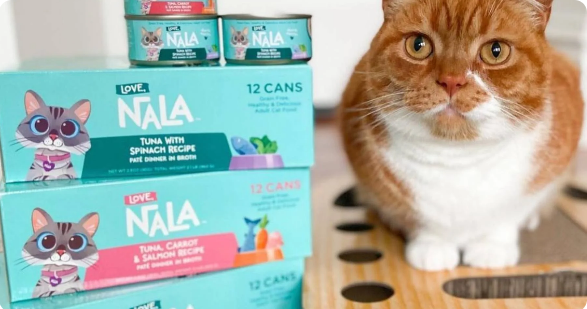The world of feline nutrition can feel like a labyrinth, fraught with choices at every turn. It’s a challenge that every cat owner faces – finding the healthiest cat food to suit their feline friend’s unique needs. A healthy, balanced diet plays a pivotal role in maintaining your cat’s overall well-being, influencing everything from their lifespan and energy levels to the luster of their fur. This comprehensive guide aims to navigate you through this complex journey, providing key insights into feline nutrition and guiding you towards selecting the healthiest cat food.
The Essentials of Feline Nutrition
Understanding a Cat’s Nutritional Needs
Firstly, we need to recognize that cats are obligate carnivores. This biological imperative means their bodies require certain nutrients that are predominantly found in meat. High-quality proteins form the cornerstone of any healthy cat food, providing the essential amino acids your cat needs. Moreover, cats require certain fats for energy and the absorption of fat-soluble vitamins. They also benefit from a moderate amount of carbohydrates for extra energy, although they should not be the primary component of your cat’s diet. In addition to these macronutrients, cats need a balance of vitamins and minerals for various bodily functions, along with an adequate supply of water to maintain hydration.
Special Considerations Based on Age, Weight, and Health
Not all cats have the same nutritional requirements. Kittens, adults, and senior cats each have different dietary needs corresponding to their stage of life. Likewise, underweight or overweight cats and those with specific health conditions may need specialized diets. For instance, kittens require more protein and fat for their rapid growth, while senior cats might benefit from diets lower in calories but rich in fiber and essential nutrients. Regular veterinary consultations are crucial to understand and meet these diverse nutritional needs effectively.
How to Choose the Right Cat Food
Recognizing Quality Ingredients
Selecting a healthy wet cat food or dry alternative involves more than just checking the flavor. Understanding the ingredients listed on cat food labels is vital. Look for those that list high-quality proteins, like named meat or meat meals, as the first ingredient. These are generally a good indicator of a food’s overall quality. Healthy fats, such as those from named animal sources or fish oil, should also be present. Ingredients to avoid include low-quality fillers like meat by-products and artificial additives, as they offer little nutritional value and could potentially harm your cat’s health.
Grains, Gluten, and Other Potential Allergens
Some cats may develop allergic reactions or sensitivities to certain ingredients commonly found in cat foods, including grains and gluten. If your cat displays symptoms like itching, digestive issues, or changes in behavior after meals, they may be reacting to an allergen in their food. In such cases, a grain-free or gluten-free diet may be recommended. However, such diets should only be implemented under veterinary supervision to ensure that your cat still receives balanced nutrition.
Wet Food vs. Dry Food
When it comes to the debate between healthy dry cat food and its wet counterpart, each has its pros and cons. Dry food, for example, is more convenient and can be better for dental health, but it often contains more carbohydrates and less moisture than wet food. Wet food, on the other hand, is a good source of hydration and usually contains more protein, but it can be more expensive and less convenient to store. The key is to find a balance that suits your cat’s preferences and nutritional needs, while also fitting into your lifestyle and budget.
Special Diets and Dietary Supplements
Prescription Diets
These are tailored to address specific health issues, such as kidney disease or allergies, and are often recommended by veterinarians. These specialized diets are formulated with precise nutrient composition to support your cat’s unique needs. Although they may be pricier than regular cat food, prescription diets play a vital role in managing and improving your cat’s health. Through providing targeted nutrition, they can help alleviate symptoms, promote healing, and enhance overall well-being, making them an essential tool in your cat’s healthcare regimen.
Dietary Supplements for Cats
These dietary supplements can be beneficial for cats to make sure they receive essential nutrients, especially if they have specific health conditions or are on homemade diets. However, it’s crucial to exercise caution as excessive or unnecessary supplementation can have adverse effects on their health. Consulting with your veterinarian before introducing any supplements to your cat’s diet is essential. They can assess your cat’s individual needs, recommend appropriate supplements, and provide guidance on dosage and potential interactions with existing medications. Your vet’s expertise will help guarantee your cat’s nutritional needs are met safely and effectively.
The Importance of Regular Veterinary Consultations
Your vet is an invaluable resource when it comes to determining the best diet for your cat. Regular veterinary check-ups allow your vet to monitor your cat’s health and detect any potential issues early. They can then provide personalized advice, adjusting your cat’s diet as needed to address any health concerns and ensure their nutritional needs are met.
Ensuring that your cat enjoys a balanced and nutritious diet is one of the most effective ways to promote their health and happiness. While understanding the complexities of feline nutrition can be daunting, it is well worth the effort for the benefits it brings. The key lies in being attentive to your cat’s nutritional needs, informed about their food, and proactive in seeking veterinary advice. Embarking on this journey is a significant step towards providing your beloved pet with the care they deserve, directly contributing to their vitality, longevity, and overall quality of life.

